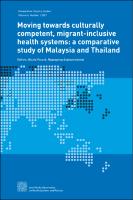| dc.contributor.editor | Nicola S. Pocock; Rapeepong Suphanchaimat | |
| dc.date.accessioned | 2021-11-10T04:12:47Z | |
| dc.date.available | 2021-11-10T04:12:47Z | |
| dc.date.issued | 2021 | |
| dc.identifier.isbn | 978-92-9022-830-1 | |
| dc.identifier.uri | https://resources.equityinitiative.org/handle/ei/247 | |
| dc.description.abstract | Migrants are seldom included in policy discussions on the provision of health care, and in country policy reforms towards health for all. In addition, evidence on health care for migrant populations to inform and guide policy makers is limited. This Comparative Country Study (CCS) uses mixed-method approaches to analyse the extent to which two middle-income countries – Thailand and Malaysia, have culturally competent, migrant-inclusive health systems. The countries have taken different approaches to developing a migrant-inclusive health system. By featuring two countries at different stages of development of migrant-inclusive health systems, the case studies highlight there is no “one size fits all” solution, and that different policy options can be considered, the depending on where each country lies along the path towards truly inclusive, rather “migrant-inclusive UHC. | |
| dc.format.extent | 118 p. | |
| dc.language.iso | en | |
| dc.publisher | the Asia Pacific Observatory on Health Systems and Policies | |
| dc.rights | © World Health Organization 2021,CC BY-NC-SA. 3.0 IGO | |
| dc.title | Moving towards culturally competent, migrant-inclusive health systems: a comparative study of Malaysia and Thailand | |
| mods.genre | Research report | |

